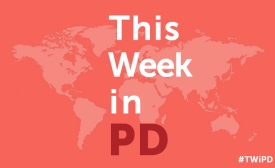science & technology

This Week in PD, we share international news on soft power, sports diplomacy, cultural diplomacy and more.
Scientists on Saturday took the unprecedented step of staging marches in more than 600 cities worldwide in the face of what they see as a growing political assault on evidence-based knowledge. Thousands of scientists and their supporters attended March for Science events in such cities as Cape Town, London, Madrid and Seoul, as well as in Australia, Brazil, Canada and Nigeria. [...] The March for Science thrusted scientists, who generally avoid advocacy and whose work is based on impartial experimentation, into a more visible spotlight.
The concept behind the Good Country Index is to determine what each country gives to the common good of humanity, and what it takes away, in relation to its size. By using a massive collection of data from the United Nations and other international organizations, the GCI gave each country some sort of a balance sheet to quickly show whether it is a net creditor to humankind, an oppressive burden on the planet, or something in between.
The 7th International Earth Science Convention will begin here [in Havana] tomorrow with geologists, geophysicists and miners from Latin America, North America, Europe and Africa. Organized by the Cuban Geological Society, the congresses of Geology, Mining, Geophysics, Informatics and Geosciences as well as the Oil and Gas Congress will be held in parallel. [...] Geosciences 2017, as it is also called, will be attended by Latin American researchers from Venezuela, Mexico, Brazil, Argentina, Chile, Ecuador, Colombia and Haiti.
Hoffman coordinated with the nonprofit Global Medical Relief Fund and a team of volunteer surgeons and other medical staff members at Cohen Children’s Medical Center — part of North Shore University Hospital — to arrange for Janet to have the surgery, which was performed for free in January.
In view of its versatility, science diplomacy becomes a convenient tool of public diplomacy. There are a number of formal and informal agencies of diplomacy functioning parallel, with and without interaction with each other in public diplomacy. By cultivating people to people connectivity across political borders, scientists, researches, academicians and artists who work in cultural reproduction process operate without borders.
Satellites might be able to help stamp out global poverty by indicating where help is needed most, according to a team of U.S. researchers. The images from satellites could help governments and charities trying to fight poverty but who lack precise, reliable information on where poor people are living and what they need, said the researchers, based at Stanford University in California.
Fourteen talented students and teachers from the United States will travel to Tokyo, Japan for the third annual TOMODACHI Toshiba Science & Technology Leadership Academy, where they will team up with Japanese students and teachers. The week-long program is designed to foster closer ties between American and Japanese participants...







